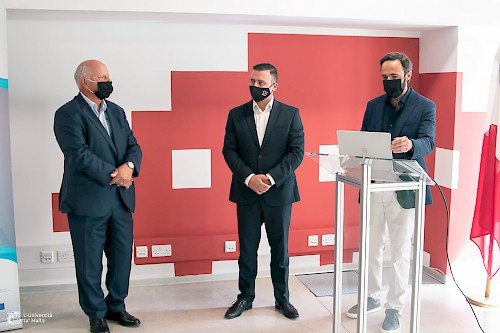
Using Virtual Reality Games to Treat Brain Injuries


Prof. Stefano Gualeni contributed to a recently published study about the use of VR games for rehabilitation. The article ‘Virtual reality-based treatment for regaining upper extremity function induces cortex grey matter changes in persons with acquired brain injury’ was published in the Journal of NeuroEngineering and Rehabilitation last week, and was a result of a collaboration between the various hospitals and universities in the Czech Republic, researchers in the United States, and of course the Institute of Digital Games at the University of Malta.

Health Games: Virtual Reality in Healthcare
The paper presents a study in which stroke survivors with partial paralysis in the upper limb used a digital game where they used an unaffected limb to execute tasks in a gameful virtual world. The findings of the study suggest that the virtual rehabilitation program significantly improved motor function and skills in the affected upper extremities of the subjects.
Games Beyond Entertainment
The industry recognition for the potential of games beyond entertainment has grown in the past years. BAFTA, for example, has now a category focused on Games Beyond Entertainment, which featured mainly games aimed to have positive effects on the individual (therapy, self-expression, rehabilitation) as well as on society (rhetorics, education, etc.). This year’s Foundation for Digital Games also included an entire track on Games Beyond Entertainment, pushing the boundaries of what is possible to accomplish with games. With this track, Prof. Gualeni was looking for work in game studies, game design, and game development that attempted to use games in new, socially beneficial ways. As he stated in his discussion on FDGTV, games are already used often in ways that go beyond merely entertainment, but this currently tends to focus on the educational aspect, when there is so much more potential for this interactive medium. Examples of games that push these boundaries that were developed at theInstitute of Digital Games include:
-
Construction BOOM! - a satirical boardgame developed at the Institute of Digital Games, is an example of a game with aspirations to motivate change and have a social impact.
-
"HERE" - a digital thought experiment about indexicality in a virtual world
-
Something Something Soup Something - a digital, playable thought experiment about the ambiguities of language.
Harnessing the Potential of VR and AI in Games
Researchers and developers are beginning to harness the power of games beyond entertainment, including in this case for medical purposes. Speaking at Congreso Futuro, the leading technology forum in Latin America, Prof. Yannakakis - Director of the Institute of Digital Games also referred to the broad impact games have had on the progress of AI and then consequently how AI and games can further revolutionise other disciplines.

Rector of University of Malta Prof. Alfred Vella, Parliamentary Secretary Hon. Clayton Bartolo, and Director of the Institute of Digital Games Prof. Yannakakis
During a recent visit by the Parliamentary Secretary Hon. Clayton Bartolo last week, the Institute presented PrismArch, a new research project where they will be collaborating with re-known architectural firm Zaha Hadid to develop a VR tool to be used by architects, designers and engineers to assist in the safe and spectacular construction of buildings.

